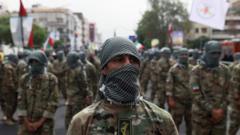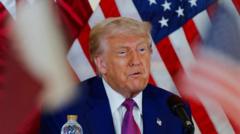In a strategic pivot during his overseas engagements, Trump expresses openness to past adversaries, underlining his desire for peace and economic cooperation while facing political opposition back home.
Trump's Foreign Charisma: A Contrast to Domestic Policies

Trump's Foreign Charisma: A Contrast to Domestic Policies
Amid investigations and political strife at home, President Trump embarks on a foreign tour, emphasizing reconciliation in the Middle East.
During his first major trip abroad in his second term, President Trump is projecting a reconciliatory image to audiences in the Middle East despite facing significant political challenges domestically. While he is embroiled in investigations targeting his political rivals and exercising his executive powers against even mild dissenters at home, his messages in foreign lands bear a markedly different tone.
“I have never believed in having permanent enemies,” Trump stated during a speech at the Saudi-U.S. Investment Forum in Riyadh. This remark reflects his approach toward Iran, a nation accused of plotting to assassinate him post-presidency—an allegation Iran denies. Trump’s willingness to forgive past animosities signals a potential shift in foreign relations focused on pragmatic engagement rather than longstanding grievances.
In a surprising move, Trump announced during the same address that he would be lifting U.S. sanctions on Syria, a controversial decision that proposes to offer economic relief to a nation grappling with civil war and international isolation. His willingness to extend an olive branch to Syria aligns with his broader aim of fostering peace and opening pathways for investment in the Middle East, even at the expense of ignoring previous hostilities.
As Trump navigates his international diplomacy, the dichotomy between his homefront aggressiveness and foreign overtures poses significant implications for his administration’s strategy moving forward and raises questions about the impact on America's global standing and credibility.
“I have never believed in having permanent enemies,” Trump stated during a speech at the Saudi-U.S. Investment Forum in Riyadh. This remark reflects his approach toward Iran, a nation accused of plotting to assassinate him post-presidency—an allegation Iran denies. Trump’s willingness to forgive past animosities signals a potential shift in foreign relations focused on pragmatic engagement rather than longstanding grievances.
In a surprising move, Trump announced during the same address that he would be lifting U.S. sanctions on Syria, a controversial decision that proposes to offer economic relief to a nation grappling with civil war and international isolation. His willingness to extend an olive branch to Syria aligns with his broader aim of fostering peace and opening pathways for investment in the Middle East, even at the expense of ignoring previous hostilities.
As Trump navigates his international diplomacy, the dichotomy between his homefront aggressiveness and foreign overtures poses significant implications for his administration’s strategy moving forward and raises questions about the impact on America's global standing and credibility.




















